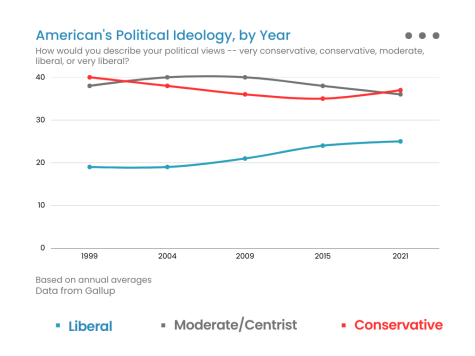The privilege of American centrism
In a world where extremities can only find relief with the help of assertive and distinguished measures, the existence of centrism disregards this common issue through a privileged, reductionist political worldview. While centrism rises in popularity as general privilege becomes more common in countries such as America, the importance of fighting injustices with extreme measures loses its touch.
May 14, 2023
Centrist, politically moderate, middle-of-the-roaders—in a world of political extremes, people feel the absolute need to stick to the center. By definition, centrism refers to a political middle ground between the usual left versus right ideology that appeals explicitly to making peace and compromise between parties. In this case, it also includes making decisions that do not upset other political groups and not leaning too far into a particular political ideology. Centrism frequently receives praise for its illusions of equality. After all, the ability to look at several sides of a spectrum and choose a middle realm where both sides can sustain their own aspects appears like a discernible train of thought. Even in the media, the rise of the centrist hero evolves—the idea of a hero who shakes hands with all sides remains unrestrained in their lack of connection toward a specific political ideology, giving them this seemingly free reign to remain politically perfect, tolerant and “unbiased”. The middle signifies comfort and safety in a world of madness and disregards the absolute need to defend the average citizen from violations of their rights.
“I do not agree that centrism is useless, in fact, extremism in itself can be associated with major catastrophes and conflicts within governments and society. I do understand that many decisions require a politician to take affirmative action, however…moderate political views tend to pull in both sides of the argument and have been very effective in bipartisanship. It is honestly shocking that having moderate political views is now labeled as useless and ineffective considering the majority of humans see both sides. Not many issues have been solved by extreme responses, and ultimately, centrism is more efficient at pulling people together from all sides,” junior Nathaniel Jordan said.

In theory, centrism seems like a perfect idea, but in practice, true centrism can not subsist in the climate of American society. Centrism in itself comes from privilege and dismisses the intricacies of worldly conflict. Commonly, centrists try to fit all ideals into a worldview, which simply can not exist in the realms of extremities of political parties; centrism stands as a meaningless standpoint that tries to ridicule non-centrists for their inability to bring peace to one another. Peace and a middle ground between parties can not subsist in a world filled with viewpoints that fight for the injustices of their opposition. Considerably not a new concept—numerous political ideologies that still grow to popularity today base themselves on the fundamentals of fascism, racism and neo-nazi ideology. Placing oneself as completely centrist disregards the need to express urgent politics regarding the average citizen’s safety and enforces an idea of brushing off severe issues that need politically subjective intervention.
“A lot of what are now considered moderate–AKA centrist–positions were seen as radical not long ago, when this country supported segregation, banned interracial marriages and then same-sex marriages, prevented women from holding some positions and queer people from others and excluded disabled people from almost everything. The center is biased, and those biases matter,” Guardian columnist and author Rebecca Solnit said.
Regarding the understanding that centrism does not exist in any type of true or unbiased form, using the term can become a manipulative tactic used in political spaces to brand someone as peaceful and unbiased. Centrism enforces that idea of harmony in chaos, but several “centrist” politicians and citizens claim the label to appear as a secure, safe person to put trust in politically, while their genuine political views truthfully lean into conservatism hidden within the hopes of reaching support from left-wingers to boost themselves to political popularity. Centrists generally swing in a right-winged direction without realizing it, but continue to double down by using the centrist label to disregard their conservative beliefs and statements; several centrists also continue to “serve the right” by justifying extremist ideals of conservatism by protecting their viewpoints.
Centrism bases itself on making peace, but peace cannot exist in an already broken society that needs uncompromisable intervention in order to enact change. Moreover, even in cases where political ideologies seem similar on the political spectrum, disagreement stands as an essential component in fighting for the vital needs of the public. Thus, American centrism remains a useless, redundant and heavily reductionist label that merely depicts a false sense of security and peace for the privileged individual.
“…I have been gravely disappointed with the White moderate…the White moderate who is more devoted to ‘order’ than to justice; who prefers a negative peace which is the absence of tension to a positive peace which is the presence of justice; who constantly says ‘I agree with you in the goal you seek, but I can’t agree with your methods of direct action;’ who paternalistically feels he can set the timetable for another man’s freedom; who lives by the myth of time and who constantly advises the Negro to wait until a ‘more convenient season,’” Reverend Martin Luther King said.







